#FormalMentoring
Explore tagged Tumblr posts
Text
EFFECTIVE FORMAL MENTORING: PROVEN STRATEGIES AND BENEFITS - A PERSPECTIVE – CHAPTER -02
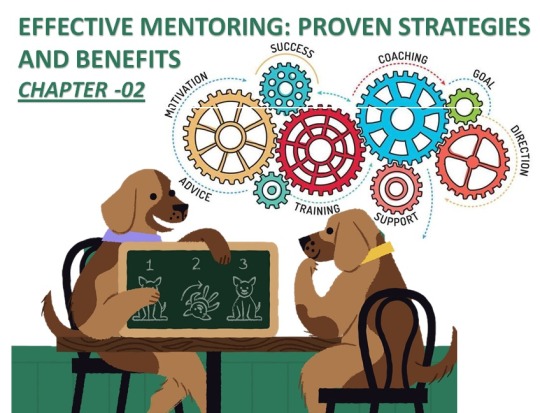
***Continued from Chapter 01 (Importance of Mentoring, Constructing Reciprocal Relationships, Definitions Of Coaching, Consulting, Mentoring And Training, Challenges in Creating a Mentoring Program)
Link to Chapter 01:
Impressive Corporate Mentorship Programs That Worked
The most recognizable organizations in the world see mentorship as a competitive advantage. Corporate Mentorship Programs prove the power of investing in employee development. Mentorship Programs Come in All Shapes & Sizes, and there may not be a one-size-fits-all model. That doesn't mean we need decades of experience to build the program that's right for us. The most effective leaders tailor their programs around 4 basic components: participants, style, format, and purpose.
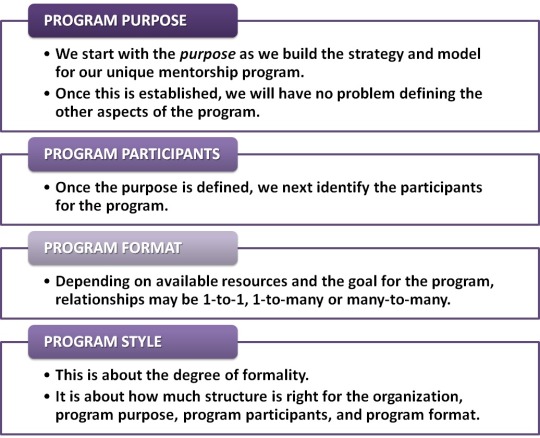
Some interesting examples of Stellar Corporate Mentorship Programs may be as follows:
A) Boeing: . . . .

Program Focus: Career and Leadership Mentoring
Program Description: After extensive research, Boeing established formal best practices to drive program success across their organization. Programs operate under strict parameters and defined goals. Programs even feature orientation sessions where program participants develop the skills necessary to maintain mutually beneficial relationships.
In Boeing’s Rotational Program interns and new employees partner with senior managers and executives to set career goals and plans across business, engineering, HR, and IT departments.
Boeing believes that diversity is essential for success and their 1-to-1 Learning Program backs that up. Peers from a wide range of backgrounds meet 1-to-1 to expand their perspectives and learn the skills they need to succeed in a global workforce.
At the Boeing Leadership Center, future leaders are partnered with current leadership to learn the interpersonal skills they will need to help all employees reach their full potential.
B) Caterpillar: . . . .
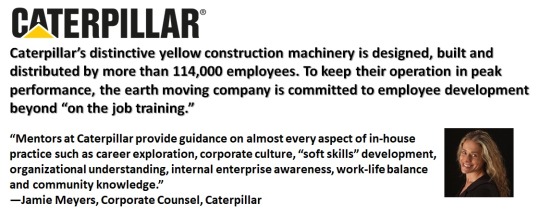
Program Focus: Career Mentoring
Program Description: Caterpillar places an intense focus on development for interns and young employees. Over the course of two to three years, program participants work to develop core skills in their focus area. Through deep personal relationships with executives and senior management, mentees also get the chance to develop advanced leadership skills. Whether employees are interested in leadership, technical development, engineering or HR, there is a program for each. Employees can learn more on their mentorship site and careers pages too.
C) McGraw-Hill: . . . .
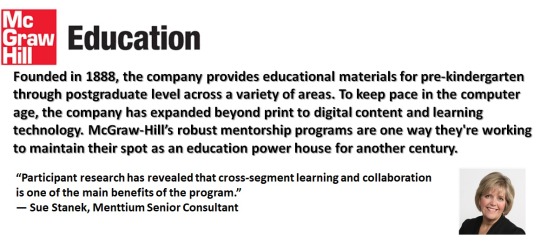
Program Focus: Broaden Perspective and Leadership Development
Program Description: To broaden perspectives across more than 20,000 employees in 38 countries, McGraw-Hill draws from a variety of business units and countries to form the core of their mentorship program. Like Boeing, McGraw-Hill knew that program success for such a large organization would come down to execution. To make sure the program produced results, McGraw-Hill's Women's Initiative for Networking and Success conduct extensive research to develop formal best practices.
McGraw-Hill partnered with Menttium Corporation to ensure a flawless execution. Consultants partnered with senior leadership to define goals around leadership development, thought leadership, broadening perspectives, and more.
D) Sodexo: . . . .
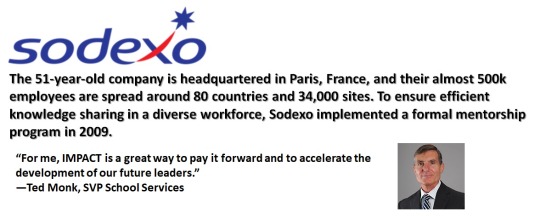
Program Focus: Career Mentoring
Program Description: Offered to all employees in the U.S., Sodexo’s three-part Spirit of Mentoring program is built to facilitate knowledge transfer and career development.
Sodexo describes the program as "an opportunity to help one another develop through collaboration, goal achievement and problem solving." They go on to say that "mentoring is a developmental partnership through which partners share perspectives as they foster personal and professional growth."
In the IMPACT program, long-lasting partnerships are forged where mentor and mentee develop relationships that continue past the formal end of their program. During the informal Bridge and Peer-to-Peer Programs, frontline managers and new hires come together to share best practices, development opportunities and to spread diversity through the management level.
E) Zynga: . . . .
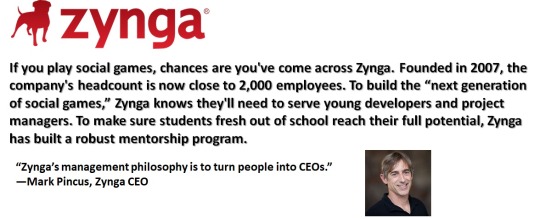
Program Focus: Career Development
Program Description: Recent graduates start with a one-week intensive program designed to get new employees up to speed. Over the next six months, employees are exposed to a variety of focus areas. Once participants graduate from the program they get the chance to make important decisions about which team they'll join.
Students within two years of graduating can participate in Zynga's internship program. During the program interns receive all the benefits of full-time employees while they explore personal projects and build their professional networks.
A Mentor’s Toolkit
More often than not, a mentee will not be somebody that we work with directly. What this means is that we don't have full context around decisions being made in their company or by them, so we really can't critique them or give feedback as we would for somebody that we are directly managing. As a mentor, we have three basic tools in our belt to help the mentee:
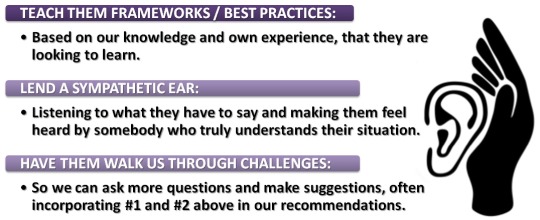
For example, if the mentee is having trouble with stakeholder management, have them talk about a specific recent example. If they’re having trouble with roadmap management, have them show how they manage the roadmap today and explain the challenges they’re having. We can then ask lots of questions to gain enough context to make suggestions.
Common mistakes in Mentoring: . . . It is possible to note a high increase in productivity and teamwork as a result of a properly structured mentoring process. Though, when referring to mentoring, we may remember the possible shortcomings and peculiarities of the mentoring process. In the process of mentoring, situations can arise that lead the whole process to unexpected results without any benefits. The most common mistakes are:
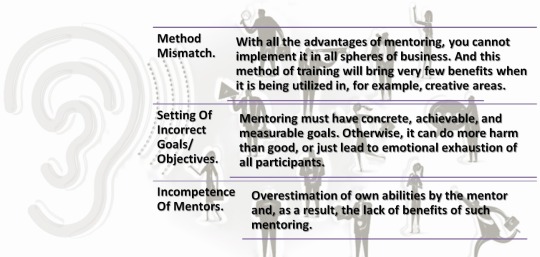

Content Curated By: Dr Shoury Kuttappa

#socialintelligence#emotionalintelligence#behaviours#coaching#decisionmaking#gratitude#relationships#ReciprocalMentoring#FormalMentoring#CareerGrowth#LeadershipDevelopment#MentorshipGoals#Mentoring#Leadership#SkillDevelopment#CareerMentorship#dr shoury kuttappa
0 notes
Text
EFFECTIVE FORMAL MENTORING: PROVEN STRATEGIES AND BENEFITS - A PERSPECTIVE – CHAPTER -02
***Continued from Chapter 01 (Importance of Mentoring, Constructing Reciprocal Relationships, Definitions Of Coaching, Consulting, Mentoring And Training, Challenges in Creating a Mentoring Program) Link to Chapter 01: EFFECTIVE FORMAL MENTORING: PROVEN STRATEGIES AND BENEFITS – A PERSPECTIVE – CHAPTER -01 Impressive Mentorship Programs that Worked (Corporate) The most recognizable…
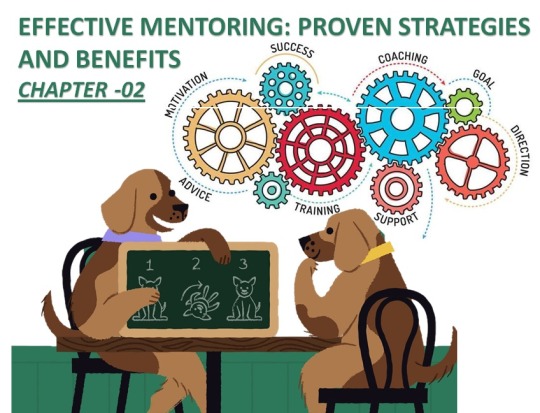
View On WordPress
#behaviours#CareerGrowth#coaching#decisionmaking#emotionalintelligence#FormalMentoring#gratitude#leadership#LeadershipDevelopment#mentoring#MentorshipGoals#ReciprocalMentoring#relationships#SkillDevelopment#socialintelligence#career#mentor#mentorship
0 notes
Text
EFFECTIVE FORMAL MENTORING: PROVEN STRATEGIES AND BENEFITS - A PERSPECTIVE – CHAPTER -01
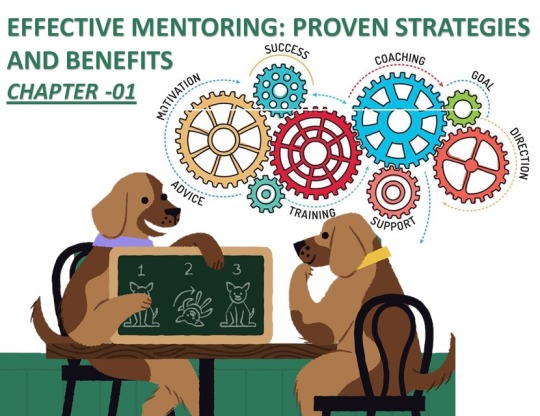
Mentoring is a reciprocal and collaborative at-will relationship that most often occurs between a senior and junior employee for the purpose of the mentee’s growth, learning, and career development. Often the mentor and mentee are internal to an organization, and there is an emphasis on organizational goals, culture, career goals, advice on professional development, and work-life balance. Effective mentors often act as role models and sounding boards for their mentee and provide guidance to help them reach their goals.
Mentorship stands for structured guidance, provided by a more experienced person to a junior trainee. Mentoring can be further defined as ‘support and encouragement of someone to manage their own learning so that they may maximize their potential, develop their skills, improve their performance and become the person they want to be.’
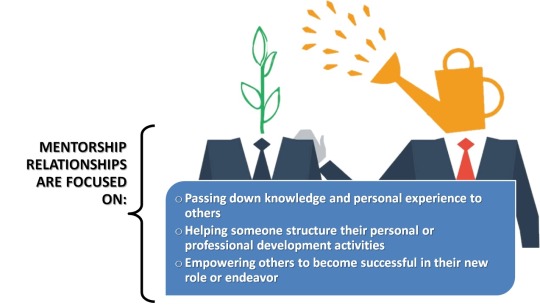
Formal mentoring programs – organization-assisted matching between a mentor and a protégé, usually short term – are a way of helping newcomers learn the ropes and/or assisting more junior employees to advance in their careers. What is perhaps less common is for these formal mentoring relationships to advance and become strong long-term work connections, as may be the case with informal mentoring – when we naturally gravitate to mentor someone.
What’s critical to make the formal mentoring program more beneficial is to promote holistic exchange instead of strict mentoring guidelines. Many formal mentoring programs come with a set of guidelines that mentoring partners may be asked to follow. However, successful formal mentoring relationships work at lowering the initial uncertainty when meeting someone new. This entails partners' willingness to openly share their previous career journey early on in the formal mentoring relationship. Thus, approaching a new mentoring relationship in a more holistic fashion and being open to sharing one's background more broadly are some of the key characteristics of successful formal mentoring.
Constructing Reciprocal Relationships
We typically think of a mentor as someone in a more senior or leadership role for example, while the protégé would be a more junior employee wishing to advance in the organization. This traditional type of structure often creates certain power dynamics where the mentor is seen as the "guru" and the protégé is there to learn from him/her. However, the best relationships are those that foster mutual exchange, no matter the rank in the organization. The greatest amount of learning and strongest relationships seem to be those where mentoring partners take turns in terms of knowledge exchange and there is clear reciprocity (i.e., partners responded to the needs of each other) and learning happens on both sides. Thus, formal mentoring programs should foster the idea that both partners are equal contributors and only when sharing and learning is reciprocal can these relationships grow into more positive and long-lasting relationships.
Definitions Of Coaching, Consulting, Mentoring And Training
One person might call themselves a coach, but really what they’re doing is training. Another might be a consultant but they’ve labelled their service as mentorship. Here’s a quick overview of each.
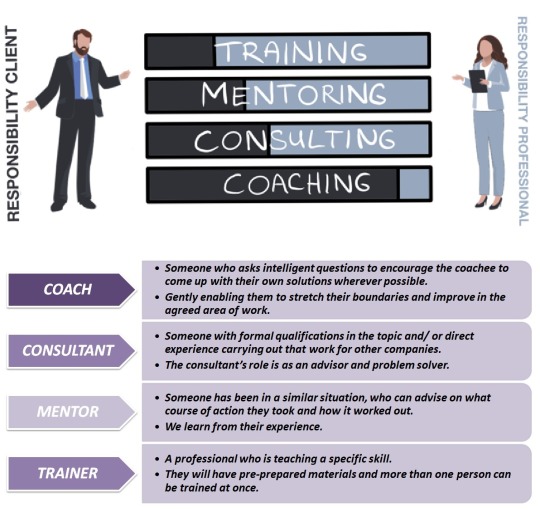
Challenges in Creating a Mentoring Program
Implementing a formalized mentorship program sounds good, but it can have a real downside: that of Power. The idea here is that a senior person would pair with a junior and mentor them about all things. The problem is that those same senior members assigned as mentors will be making decisions about the future of the junior when it comes time for promotion and tenure. And it’s unlikely that they will spend a great deal of time reflecting on whether they did a good job mentoring a particular recruit as the promotion file is being evaluated.
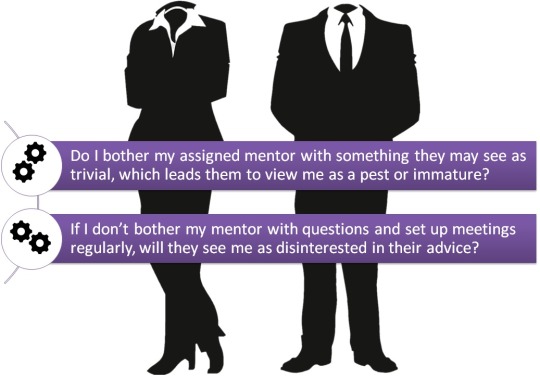
Mentorship May Fall Into Two Categories: Forced (Or Formal) & Organic (Or Informal).
Forced mentorship is often the kind that exists in “programs” aimed at helping junior people work through the complex power and policy structures that exist in an organization. The problem is that the person doing the mentoring is usually also embedded in those structures and, in fact, may be both symbolically and practically someone who holds power over junior employees. Here, the junior person is unlikely to query about or raise issues that may be controversial or that might suggest anything negative about the organization.
In other words, forced mentoring programs may look good on paper, because they make it appear as though an organization is enacting policies and procedures to help junior employees succeed and develop in their careers, but the basic power structures in any organization are likely to actually work against open and honest communication between assigned mentor and mentee.
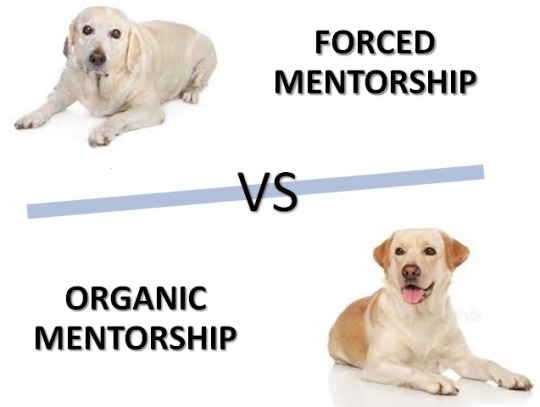
Organic mentoring relationships are much more likely to bear fruit because they are grounded in a sense of mutual trust that emerges as the relationship develops over time. This is particularly true if the relationship involves a mentor outside of the organization in which the mentee works—that can mean another company or even just another division within a company. If the relationship develops naturally, there is a good potential for the mentee to gain knowledge and insight that will help, because the mentee will feel empowered to raise difficult issues should they arise.
Programs that assign mentoring relationships within an organizational structure are more likely to reinforce power relationships and cause individuals who lack power to avoid interactions with senior staff. Creating opportunities for relationships with senior individuals that can arise organically, and that are not within one’s immediate group or division, has the potential for generating good mentoring. One way to do this is to create opportunities for people to informally and voluntarily be paired on the basis of common interest or expertise. A website where potential mentors and mentees can connect has potential to accomplish this without creating a program. But it’s necessary that the mentees’ direct supervisors are not involved and have no knowledge of who is mentoring. Before implementing the system, we need to determine how necessary it is. Usually, mentoring systems are essential in the following cases:
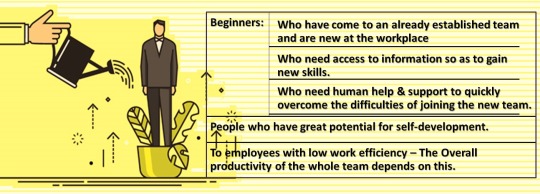
***To be continued in Chapter 02 (Impressive Corporate Mentorship Programs That Worked, A Mentor’s Toolkit, Common Mistakes)

Content Curated By: Dr Shoury Kuttappa

#socialintelligence#emotionalintelligence#behaviours#coaching#decisionmaking#gratitude#relationships#ReciprocalMentoring#FormalMentoring#CareerGrowth#LeadershipDevelopment#MentorshipGoals#Mentoring#Leadership#SkillDevelopment#CareerMentorship
0 notes
Text
EFFECTIVE FORMAL MENTORING: PROVEN STRATEGIES AND BENEFITS - A PERSPECTIVE – CHAPTER -01
Mentoring is a reciprocal and collaborative at-will relationship that most often occurs between a senior and junior employee for the purpose of the mentee’s growth, learning, and career development. Often the mentor and mentee are internal to an organization, and there is an emphasis on organizational goals, culture, career goals, advice on professional development, and work-life…
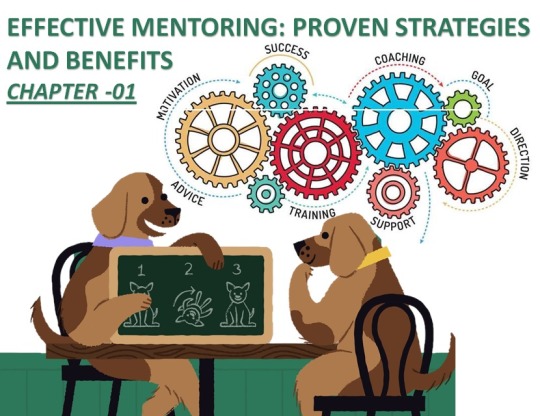
View On WordPress
#behaviours#CareerGrowth#coaching#decisionmaking#emotionalintelligence#FormalMentoring#gratitude#leadership#LeadershipDevelopment#mentoring#MentorshipGoals#ReciprocalMentoring#relationships#SkillDevelopment#socialintelligence
0 notes